Serving 830 students in grades Prekindergarten-5, Kimball Wiles Elementary School ranks in the top 30% of all schools in Florida for overall test scores (math proficiency is top 30%, and reading proficiency is top 30%).
The percentage of students achieving proficiency in math is 66% (which is higher than the Florida state average of 52%). The percentage of students achieving proficiency in reading/language arts is 63% (which is higher than the Florida state average of 52%).
The student:teacher ratio of 14:1 is lower than the Florida state level of 17:1.
Minority enrollment is 59% of the student body (majority Black and Hispanic), which is lower than the Florida state average of 65% (majority Hispanic).
Quick Stats (2025)
- Grades: Prekindergarten-5
- Enrollment: 830 students
- Student:Teacher Ratio: 14:1
- Minority Enrollment: 59%
- Overall Testing Rank: Top 30% in FL
- Math Proficiency: 66% (Top 30%)
- Reading Proficiency: 63% (Top 30%)
- Science Proficiency: 55-59% (Top 30%)
- Source: National Center for Education Statistics (NCES), FL Dept. of Education
Top Rankings
Kimball Wiles Elementary School ranks among the top 20% of public schools in Florida for:
Category
Attribute
Diversity
School Overview
Kimball Wiles Elementary School's student population of 830 students has declined by 11% over five school years.
The teacher population of 58 teachers has declined by 9% over five school years.
Grades Offered
Grades Prekindergarten-5
Total Students
830 students
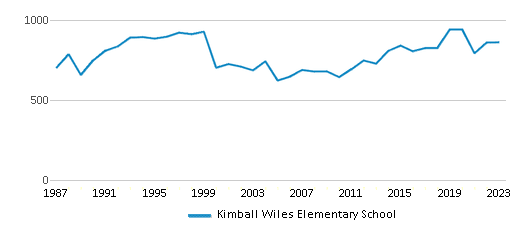
Gender %
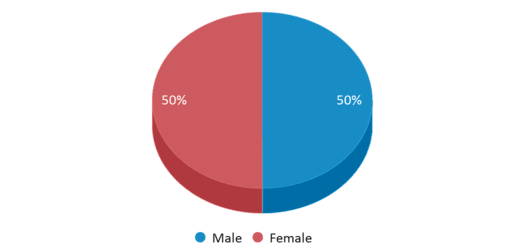
Total Classroom Teachers
58 teachers
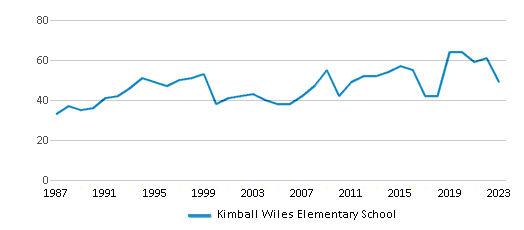
Students by Grade
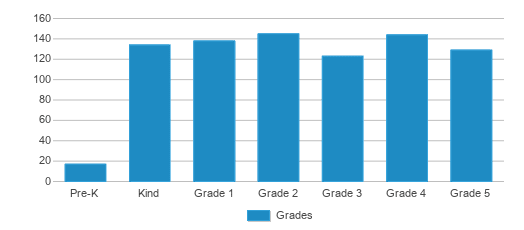
School Rankings
Kimball Wiles Elementary School ranks within the top 30% of all 3,704 schools in Florida (based off of combined math and reading proficiency testing data).
The diversity score of Kimball Wiles Elementary School is 0.74, which is more than the diversity score at state average of 0.70. The school's diversity has stayed relatively flat over five school years.
Overall Testing Rank
#885 out of 3704 schools
(Top 30%)
(Top 30%)
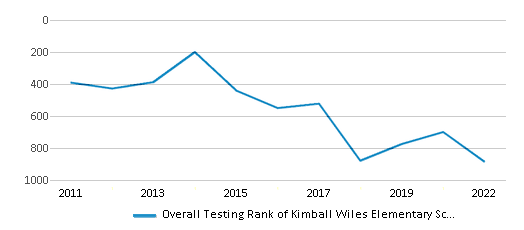
Math Test Scores (% Proficient)
66%
52%
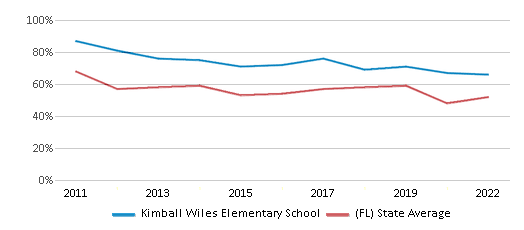
Reading/Language Arts Test Scores (% Proficient)
63%
52%
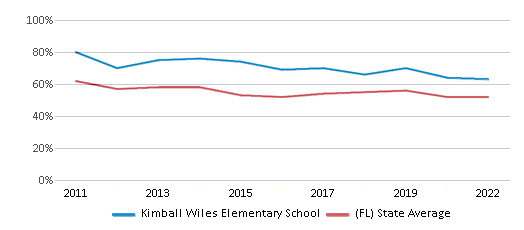
Science Test Scores (% Proficient)
55-59%
52%
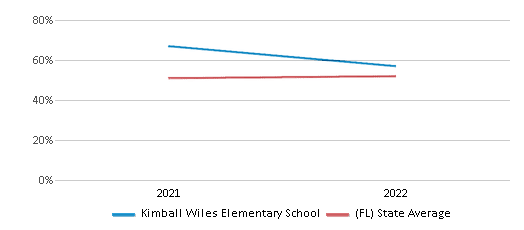
Student : Teacher Ratio
14:1
17:1
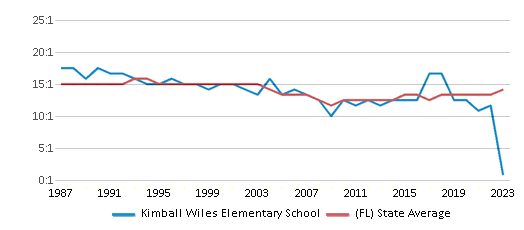
American Indian
1%
n/a
Asian
11%
3%
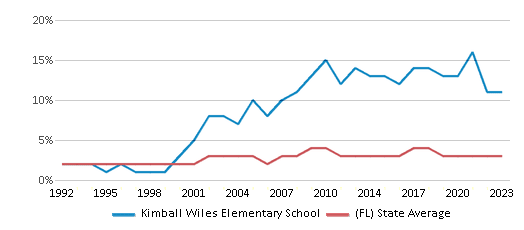
Hispanic
17%
37%
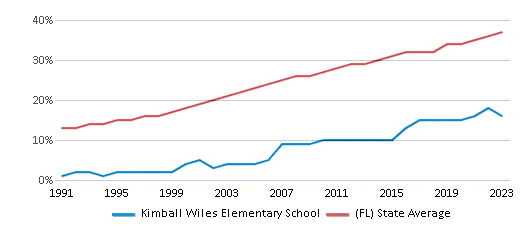
Black
22%
21%
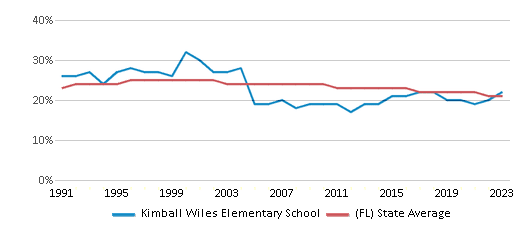
White
41%
35%
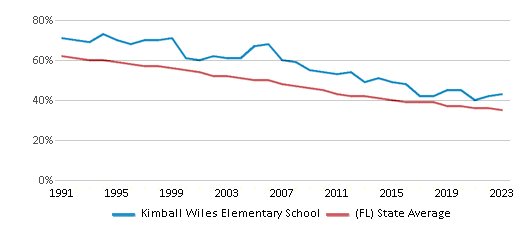
Hawaiian
n/a
n/a
Two or more races
8%
4%
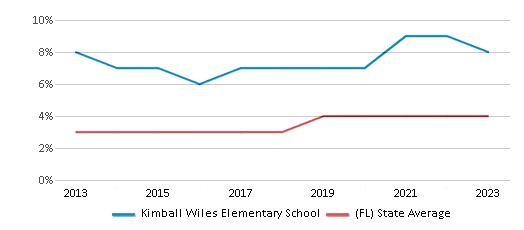
All Ethnic Groups
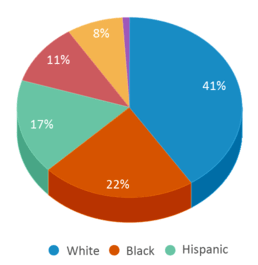
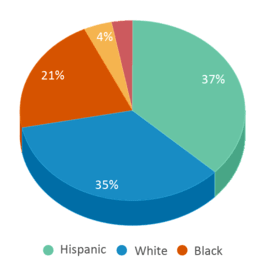
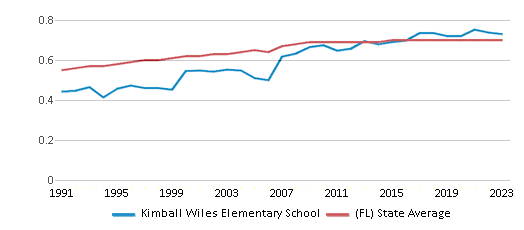
Participates in the National School Lunch Program (NSLP)
Yes
Eligible for Free Lunch
41%
47%
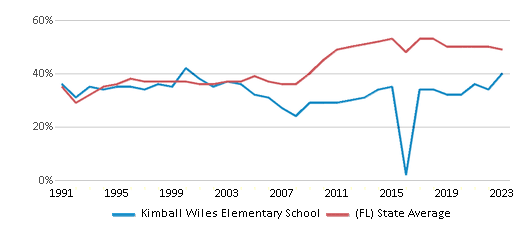
Eligible for Reduced Lunch
7%
4%
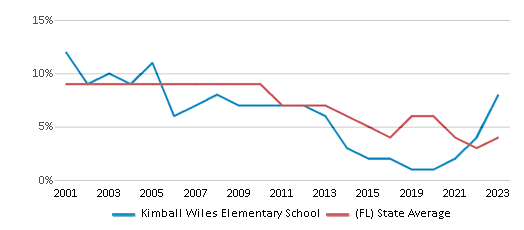
School Statewide Testing
School District Name
Source: National Center for Education Statistics (NCES), FL Dept. of Education
Profile last updated: 02/09/2025
Frequently Asked Questions
What is Kimball Wiles Elementary School's ranking?
Kimball Wiles Elementary School is ranked #885 out of 3,704 schools, which ranks it among the top 30% of public schools in Florida.
What schools are Kimball Wiles Elementary School often compared to?
Kimball Wiles Elementary Schoolis often viewed alongside schools like Lawton M. Chiles Elementary School, Meadowbrook Elementary School, Hidden Oak Elementary School by visitors of our site.
What percent of students have achieved state testing proficiency in math and reading?
66% of students have achieved math proficiency (compared to the 52% FL state average), while 63% of students have achieved reading proficiency (compared to the 52% FL state average).
How many students attend Kimball Wiles Elementary School?
830 students attend Kimball Wiles Elementary School.
What is the racial composition of the student body?
41% of Kimball Wiles Elementary School students are White, 22% of students are Black, 17% of students are Hispanic, 11% of students are Asian, 8% of students are Two or more races, and 1% of students are American Indian.
What is the student:teacher ratio of Kimball Wiles Elementary School?
Kimball Wiles Elementary School has a student ration of 14:1, which is lower than the Florida state average of 17:1.
What grades does Kimball Wiles Elementary School offer ?
Kimball Wiles Elementary School offers enrollment in grades Prekindergarten-5
What school district is Kimball Wiles Elementary School part of?
Kimball Wiles Elementary School is part of Alachua School District.
School Calendar
View the Kimball Wiles Elementary School yearly calendar below. Note key dates such as:
Event
Date
10-Month Calendar: Last Day for Students
June 03, 2025 (Tuesday)
10-Month Calendar: First Day for Students
August 11, 2025 (Monday)
School Reviews
1 8/19/2021
The kids have been going here for about a week now, and I can already see troubles in the near future. The teachers are great, the staff is great. But if you wait a minute too long in the car loop, then you will get yelled at. If you have to wait for another child in the loop at pick-up, then you will get yelled at. I was nearly hurried off without my youngest child getting in my car. My kids and I just transferred from a school nearby, and I have never seen such unprofessionalism for getting the kids to school. Please, Principal Munn, keep the kids safe but also keep account of the kids attending your school. Oh, and get there about 30 minutes early to drop off and about 45 minutes to pick up. I spoke with another parent this week, and I think that many would agree that the school needs another deputy to direct traffic coming from the stoplight. It really is a mess. Otherwise, there will be a 30-45 minute wait getting around the loop. I am strongly considering speaking to the District and withdrawing my children from this school if the hastiness continues.
5 10/24/2013
its an awesome school to go to
Review Kimball Wiles Elementary School. Reviews should be a few sentences in length. Please include any comments on:
- Quality of academic programs, teachers, and facilities
- Availability of music, art, sports and other extracurricular activities
Recent Articles

What Is A Charter School?
Explore the world of charter schools in this comprehensive guide. Learn about their history, how they operate, and the pros and cons of this educational innovation. Discover key facts about charter schools, including admission policies, demographics, and funding, as well as what to look for when considering a charter school for your child.

10 Reasons Why High School Sports Benefit Students
Discover the 10 compelling reasons why high school sports are beneficial for students. This comprehensive article explores how athletics enhance academic performance, foster personal growth, and develop crucial life skills. From improved fitness and time management to leadership development and community representation, learn why participating in high school sports can be a game-changer for students' overall success and well-being.

February 05, 2025
Understanding the U.S. Department of Education: Structure, Impact, and EvolutionWe explore how the Department of Education shapes American education, from its cabinet-level leadership to its impact on millions of students, written for general audiences seeking clarity on this vital institution.





